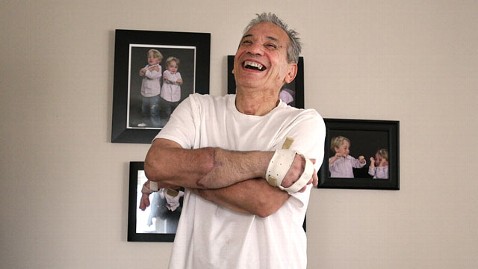Transplant Legacy: Donor's Hands Help Artistic Amputee
By donating her late husband's skilled hands to an amputee so that he might once again play music and paint, a New Hampshire woman created a fitting legacy for a handy and generous man who never hesitated to help strangers.
Jodi Lloyd stayed in the background last October when Richard Mangino, 65, of Revere, Mass., underwent a double-hand transplant at Boston's Brigham and Women's Hospital. Although she met privately with Mangino two weeks afterward, only this week did she publicly identify her husband, Steven Lloyd, as the donor whose hands and forearms are giving Mangino another chance to express himself with a paintbrush, the strings of a guitar or the keys of a piano.
Steven Lloyd, an active and healthy man who did his own home repairs, fixed cars and would help snowbound strangers without a second thought, was just 43 when he collapsed at home last Oct. 1 from a massive brain hemorrhage.
His widow, Jodi Lloyd, agreed to donate several of his organs, and needed only a couple of days before agreeing to a special request from the New England Organ Bank in Waltham, Mass., to also donate his hands and forearms.
In making her decision, after consulting with her in-laws, she thought: "Why let these hands go t0 waste?" she told the Boston Globe in an interview published this week. "Steven's talents were in his hands. It just made sense to me."
The match between Lloyd and Mangino went far beyond the usual issues of tissue types and skin tones. "You couldn't have asked for a better pairing," said Darlene Fiotto, a family services coordinator for the New England Organ Bank, which helped facilitate the donation.
Jodi Lloyd wanted to see some of the best things about her husband live on when she agreed to donate his hands. The concept of assuring such a "legacy" underlies some families' decisions to donate the organs and tissues, Fiotto told ABCNews.com.
"I hear it mostly in pediatric referrals, because the child hasn't lived long enough to have a legacy, so the donation does become part of a legacy," said Fiotto, who meets with potential donor families to discuss opportunities for donating organs and tissues, and in recent years, specialized donations for hand or face transplants. "Sometimes we have donations from people in the medical field, or firefighters, where I hear that term 'legacy' again."
Fiotto, who trained as a social worker, recalled meeting three years ago the parents of a pre-teen boy who had hoped to become a doctor, but suffered fatal injuries in an automobile crash.
"They really saw this donation as part of him saving lives. It was very profound for them that he was going to go on and do what he had set out to do on his path in life," she said. "It was uplifting for them. I felt honored to be a part of that. I knew this was something that was going to help them with the grief."
The boy's organs were transplanted into six recipients and other tissues were prepared for later use by ideal recipients, she said.
Lloyd said that when she met Mangino, a father of three and grandfather of two who had lost his hands and feet to a life-threatening blood infection in 2002, she felt she'd met the right recipient, which provided her with "some comfort." Although she was nervous at that meeting, she said that Mangino asked if she'd like to touch the hands she knew so well after a 23-year relationship.
"They definitely felt like my husband's hands and I knew they were my husband's hands because I recognized them," she told The Globe.
Mangino only began painting after his amputations; he learned to hold a brush in the prosthesis replacing his left arm. His double-hand transplant made him the 21 st person to undergo such surgery worldwide. The first was performed at the University of Pittsburgh in 2009.
His current physical therapy regimen targets fine motor skills as he stacks blocks and cones and squeezes clay. He's able to play individual notes on the piano, but not yet chords, but his doctors say he's progressing faster than expected.
